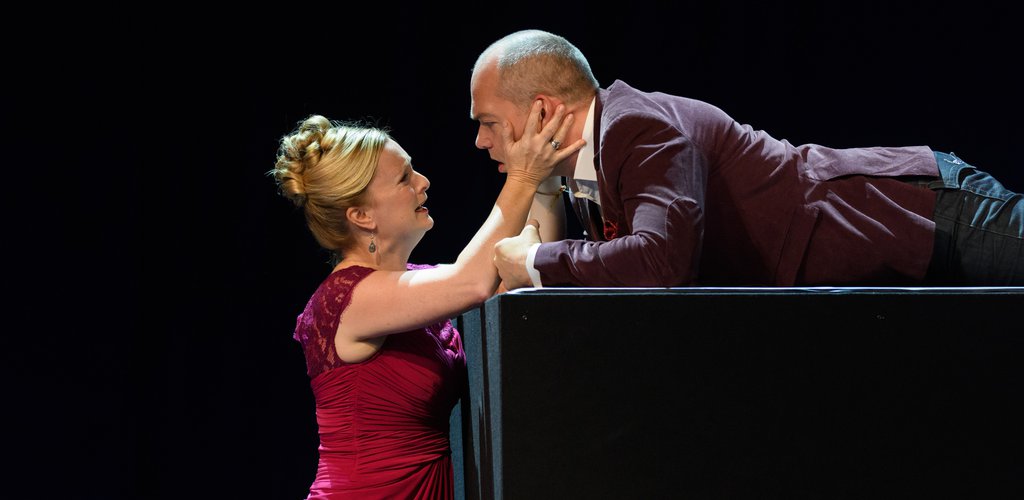First of all, the opera is magnificent; it hits so many tones of comedy and pathos, and plays out the characters so tangibly, that you feel like a participant from early on. It’s full of play on sound and words, from “si” and “no” to the musical quotations from Figaro, etc. Leporello is my favorite character; he seems a bumbling, astute, playful, corporeal Ariel longing for release from his master. (Don Giovanni is anything but a Prospero, though.) Yet every character became my favorite at times, partly because of the music, partly because of this particular performance.
This was no run-of-the-mill opera production. As Mr. Fischer explained in the question-and-answer session before the performance, while opera productions usually have a stage director and a conductor, each one with a particular focus, he could not approach the work this way; he had to be both director and conductor. This could be felt throughout. He brought together singers and musicians, stage and score, into a single life and form.
There were the silent actors, who served as props–a seat, a gravestone, a table, a building, a garden with fountain, a coach, villagers, dancers, and figments of the imagination. They appeared with moonlike glow and pallor. This had the effect of making everything physical and breathing (though also dreamlike). You could see the world through Don Giovanni’s eyes. The music was the great reality, in the subtle textures, the mandolin, the stage musicians, the trombones that accompanied the Commendatore, every single instrument, and the extraordinary voices.
That might have been the greatest brilliance of all: to let us (at moments) into Don Giovanni’s mind. It is easy to condemn him. But this performance brought us into him; not only did the objects breathe and move, but each aria, each terzetto seemed more beautiful than the last. You wanted to catch each one without fail; you would fall in love with one only to find yourself chasing the next. I disagree with James Jorden, who praises this production to the skies (in his New York Times review) but ends with the claim that it lacks “an indefinable spark of the divine.” No, it lacks no such thing. The divine is palpable, not only in the sensuality that implicates you and melts your everyday judgments, but in the surprises of beauty and soul and structure.
One of my favorite scenes of all was Zerlina’s aria “Batti, batti, o bel Masetto.” Many find this aria troubling and hard to interpret, but here the interpretation was natural and unhindered. Masetto’s look of anguish–sustained throughout the aria, up almost to the end–tells us that he would not beat Zerlina, and that Zerlina knows this. Her “Batti, batti” shows such confidence, such tenderness, that she can move closer and closer to him and find, at the end, no rancor, just jealousy and pain.
It’s easy to be fond of Zerlina and Masetto–but I also found myself entranced by Don Ottavio, the “straightest” of them all, and by Elvira, that troubled soul. I can’t just consider them singly, though; right now I am remembering the duet of Leporello and Don Giovanni in the finale of Act I, “tornerete a scherzar e ballar.” (I have been looking up favorite parts in my score this morning.) Later in the finale, Don Giovanni’s ominous “Viva la libertà!” first plays against the others’ “Siam grati a tanti segni di generosità” but then becomes the refrain of all; they sing these words as though not knowing what they (the words or they themselves) mean. There’s something mad and reckless in that “libertà,” but for a moment, all are swept into it.
But I did not always see things through Don Giovanni’s eyes, nor did Mozart’s composition or the performance encourage that. Not only is he ultimately contained and swallowed up in flames, not only do the others go on with their lives, but throughout the work there are scenes of censure, scenes where Don Giovanni faces the disapproval, disgust, and disdain of each of the others, who, with all their fallibility, understand something about living. His excess froths, centerless–and the music itself, while gorgeously enticing, contains itself as it contains him. Don Giovanni contains and moves beyond Don Giovanni. Mr. Fischer chose the Prague version of this opera, which, besides being the original version, stands out for its balance and unity. Through this balance and unity, the opera (as I hear it) responds to Don Giovanni himself.

